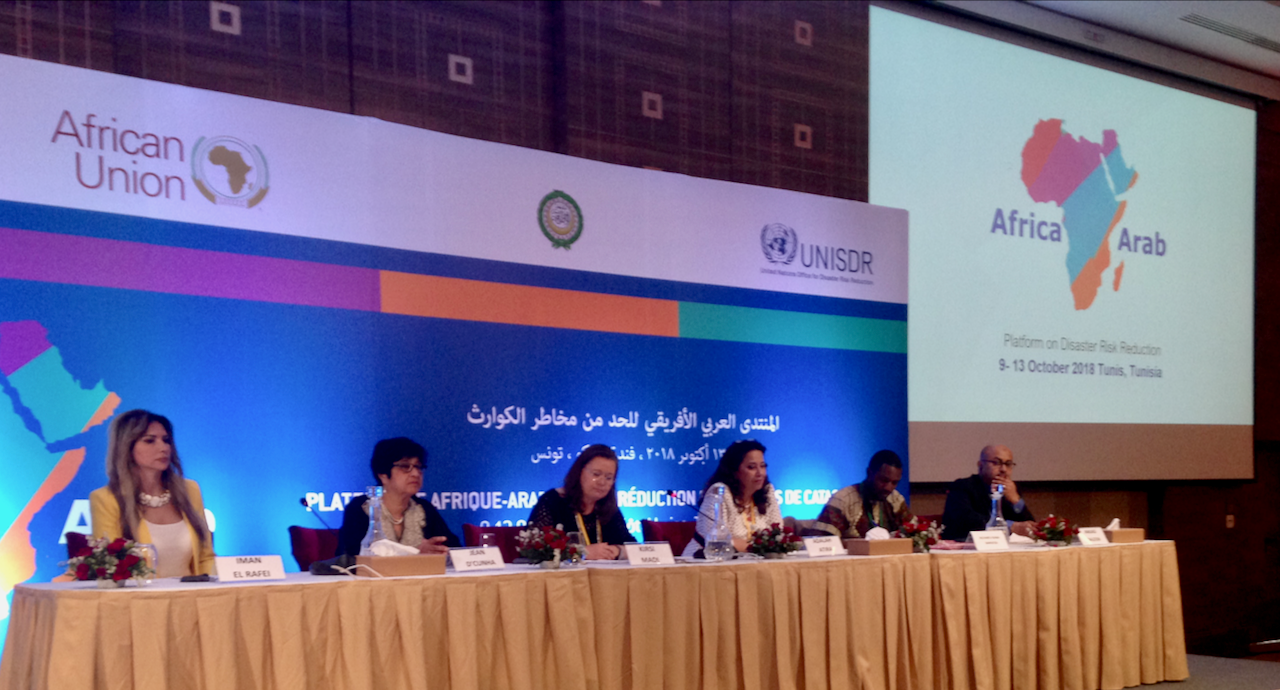UN Women highlights gender dimension in the first ever Africa-Arab Platform on Disaster Risk Reduction
Date:

The first ever Africa-Arab Platform on Disaster Risk Reduction (DRR) was convened between 9-13 October 2018 in Tunis, Tunisia, organized by the United Nations Office for Disaster Risk Reduction (UNISDR), the League of Arab States and the African Union Commission, and hosted by the Government of Tunisia. The dialogue brought together about 900 participants from Africa and the Arab States including government representatives, inter-governmental organizations, academia, women, youth, civil society, UN and other stakeholders.
At the meeting, UN Women Regional Offices for the Arab States and for Africa highlighted gender equality and women’s rights as an essential component for effective work on climate change, disaster risk reduction and migration.
In the pre-conference segment, UN Women and CARE International organized the panel event: Stakeholders Forum on inclusive DRR. In addition, UN Women participated in a working session focused on gender-sensitive DRR policies, plans and programmes and their link to the Sendai Framework in the Africa and Arab States regions. The session was chaired by H.E. Eng. Adalah Ateereh, Minister of Environment of the State of Palestine and Ms. Kirsi Madi, Director of UNISDR.
Speaking at this session, Ms. Jean D’Cunha, UN Women’s Global Migration Advisor said ‘’Gender -based discrimination and inequality disproportionately burden women and girls in climate change impacts, disasters and migration. Related policies and programmes must take account of the gender differentiated experience of men, women, boys and girls and tailor responses. Women also demonstrate agency and resilience in these situations. Including women and their priorities in responding to these linked development agendas enables the best representation of their interests and taps the potential of the ‘other half’, thus contributing to sustainable development.’’
The outcome documents of the conference namely the Joint Communique on Strengthening Africa-Arab Collaboration on Disaster Risk Reduction, the Declaration of the Sixth High Level Meeting on Disaster Risk Reduction, the Arab States Ministerial Declaration on Disaster Risk Reduction, and Africa and Arab States Gender Equality and Women’s Empowerment Stakeholder Group Voluntary Action Statements included a strong component on gender equality and women’s rights. Some of the key recommendations in these outcome documents are:
- Investment in sex and age disaggregated data and gender-sensitive research and analysis on climate change, DRR, migration, including costs to GDP;
- Mainstreaming gender equality and women’s rights into national and local policies, legislation, plans with gender-sensitive targets, indicators and budget allocations on these agendas bolstered by institutionalized capacity building for duty-bearers;
- Strengthening women’s leadership to influence policy development and implementation on these agendas; investing in community-based mitigation, adaptation, DRR and migration initiatives for scaling-up.
UN Women representatives participated in the official drafting committees, convened gender stakeholders and coordinated the drafting of the Voluntary Action Statements of the Gender Equality and Women’s Rights Stakeholder Groups in both regions.
The Africa-Arab Platform on DRR served to take stock of the progress made in the implementation of the Sendai Framework and to reaffirm political commitment to achieving its implementation and thereby contribute to the realization of Agenda 2063: The Africa We Want and Agenda 2030 for Sustainable Development.